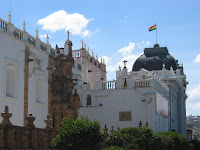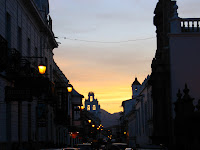

The Peace Corps publishes a book of volunteer stories to prep applicants for the challenges of service. Most of them involve overcoming campo living – rough conditions, unhurried pace of life, slow-to-change attitudes. I was ready. Then came site announcements.
For the next two years I will be living in Sucre developing the rural credit program of Pro Mujer, a NGO that micro-finances women´s enterprises. It is a great organization and I didn´t think I would get the opportunity to do something like this. But while I´ll be travelling out to our rural communities for work almost everyday, it will be a much more structured, fast-paced, and professional city environment than my campo expectations.
We took our tests and swore our service oaths the first week of November, a month after site announcements. I thought it would be hard to leave B43 but the first month has passed at warp speed. Travel to Sucre from Cochabamba is a 10-hour night bus via a sometimes paved road with less than pleasing accident statistics. It isn´t that bad besides the inconvenient angle of the seats that is constantly sifting its occupants down into the footwell, and the ridiculous heat blasting along the walls. As many Bolivians believe all sickness comes from cold air, opening windows have been known to start flota brawls.
Sucre is a beautiful city. Tiny, at 250,000, and clean by Bolivian standards. Some volunteers find Sucre too small and tranquil but I love the colonial architecture, which gives it its name of “The White City”, and the fact that unlike Cochabamba I have been able to break bills larger than 10 Bs without playing the change game. The pristine white buildings and internationals thronging the town center cover up a city that´s said to rest more on past reputation than present. Established by the old money of Potosí, Sucre is now one of Bolivia´s two official capitals in name only. I´ve also been told the University San Francisco Xavier, famous for its incubation of independence ideas, has been losing its edge to newer private universities. The current debate whether the new constitution should be approved by 2/3 vote or simple majority of the Constituent Assembly has brought in some activity, but aside from the older families and students Sucre has seen a lot of migration to more progressive departments like La Paz and Santa Cruz.
For the next two years I will be living in Sucre developing the rural credit program of Pro Mujer, a NGO that micro-finances women´s enterprises. It is a great organization and I didn´t think I would get the opportunity to do something like this. But while I´ll be travelling out to our rural communities for work almost everyday, it will be a much more structured, fast-paced, and professional city environment than my campo expectations.
We took our tests and swore our service oaths the first week of November, a month after site announcements. I thought it would be hard to leave B43 but the first month has passed at warp speed. Travel to Sucre from Cochabamba is a 10-hour night bus via a sometimes paved road with less than pleasing accident statistics. It isn´t that bad besides the inconvenient angle of the seats that is constantly sifting its occupants down into the footwell, and the ridiculous heat blasting along the walls. As many Bolivians believe all sickness comes from cold air, opening windows have been known to start flota brawls.
Sucre is a beautiful city. Tiny, at 250,000, and clean by Bolivian standards. Some volunteers find Sucre too small and tranquil but I love the colonial architecture, which gives it its name of “The White City”, and the fact that unlike Cochabamba I have been able to break bills larger than 10 Bs without playing the change game. The pristine white buildings and internationals thronging the town center cover up a city that´s said to rest more on past reputation than present. Established by the old money of Potosí, Sucre is now one of Bolivia´s two official capitals in name only. I´ve also been told the University San Francisco Xavier, famous for its incubation of independence ideas, has been losing its edge to newer private universities. The current debate whether the new constitution should be approved by 2/3 vote or simple majority of the Constituent Assembly has brought in some activity, but aside from the older families and students Sucre has seen a lot of migration to more progressive departments like La Paz and Santa Cruz.
I love my project, as painful as it was to reacquaint myself with an office setting. Imagine deleting documents several times while relearning every keyboard shortcut in Spanish. But since that first week I´ve spent some happy, spine-wrecking (more on this later) weeks with our rural groups for my project diagnostics. To get along in the campo I am also learning Quechua, an aggregating language of the Andes that was never meant to be a written language. That means different regions of Bolivia have differing ways of writing Quechua, and by aggregating I mean you tack an increasing number of suffixes onto a base word to indicate adjectives, verbs, adverbs, etc. So killa, the word for month, becomes qhepankillakama for “until next month”.
There are Christmas lights up in the main plaza now, and I am homesick.
FUN FACT/QUOTE OF THE DAY: Jabba the Hutt speaks a language based on Quechua in Star Wars.



